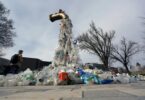RIYADH (Arabnews): The Red Sea Development Co. is using a marine spatial planning simulation — utilizing software specially developed in Saudi Arabia — to assess the developmental impact and enhance biodiversity.
Developed in partnership with King Abdullah University of Science and Technology, the technology plans, collects and analyzes oceanographic data that influences marine and terrestrial ecosystems and tracks net conservation benefits.
“Marine spatial planning helps the company decide which island to develop and which is most important to protect by integrating expert opinion, ecological principles, and a software-based decision support tool,” Lina Eyouni, environmental physical science manager, TRSDC, told Arab News on the occasion of UN World Oceans Day on June 8.
The company is contributing to this year’s theme by building cross-multiple partnerships that will enable the company to achieve its goal of 30 percent net conservation benefit throughout the project. — Lina Eyouni, Environmental physical science manager, TRSDC.
According to a TRSDC scientific paper titled “Reconciling Tourism Development and Conservation Outcomes Through Marine Spatial Planning for a Saudi Giga-Project in the Red Sea,” published in the scientific journal Frontiers in Marine Science, the company is developing comprehensive plans for enhancing coral reefs, which involves growing coral nurseries and breeding healthy corals.
The master plan for the development conserves 58 percent of the site’s marine area, with the development footprint only 5 percent of the total area.
The paper noted that the resulting conservation to development ratio of 10:1 was unprecedented in any documented coastal development plan.
“The MSP’s primary goal is to utilize the marine environment in a way that won’t harm the ecosystem by reconciling all activities and development elements assessed by the master plan with net positive conservation outcomes,” said Bandar Makhdom, environmental engagement manager, TRSDC.
He added: “Through the MSP, activities generating positive and negative interactions were uncovered, as well as minor tactical adjustments to avoid negative synergies in the ecosystem.”
To mark the UN World Oceans Day, the company participated in a workshop titled “The Role of Scientific Research and Cooperation with Relevant Authorities in Preserving the Environments of the Red Sea,” sponsored by Saudi Arabia’s Minister of Environment, Water and Agriculture Abdul Rahman Al-Fadhli.
“The company is contributing to this year’s theme by building cross-multiple partnerships that will enable the company to achieve its goal of 30 percent net conservation benefit throughout the project,” said Eyouni.
TRSDC is using adaptive ecosystem-based management for the environmental regulatory system, which will use observational data and associated modeling to provide scientific guidance for developing and protecting the ecosystem.
“TRSDC destinations will be environmentally smart by utilizing the latest technology to enhance visitors’ experiences. Additionally, the data will be uploaded and stored into a smart environmental platform to support science-informed adaptive ecosystem-based management,” she added.






